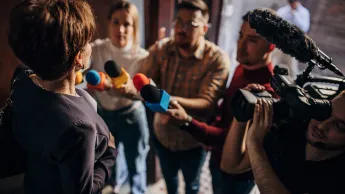Scholarship for a change of perspective
- 2022-06-02
- Miriam Hoffmeyer
- Comment

The opencast lignite mine Turów covers a length of dozens of kilometres at the south-western tip of Poland at the border triangle with Germany and the Czech Republic. The excavation work continues, despite the fact that the European Court of Justice ordered mining to stop in 2021. ‘A gigantic environmental issue,’ says Marta Thor, who is currently investigating the controversial surface mine: ‘I visit villages that are to be erased, the town Bogatynia that benefits commercially from the mine’s power plant, and environmental activists who want to turn the site into a wind and solar farm.’ The free journalist will be working in Wroclaw as a scholarship holder of the International Journalist Programmes (IJP) until the end of May. ‘Time-consuming investigation work like this would not be possible without the scholarship, as freelance journalism is rarely well-paid,’ she says.
In order to promote international exchange between media and opinion leaders, the IJPs have existed for around 40 years and offer journalists the opportunity to report from another country for a few weeks. Funding is available for scholarship stays with host media organisations in 45 countries around the world, the IJP network comprises more than 3,000 alumni. Reporting about issues related to climate and energy are at the heart of the exchange programme with Poland and countries in Central Eastern and South Eastern Europe. The scholarships are granted support from the European Climate Initiative EUKI. Marta Thor explains that the threat posed by climate change is not so apparent in Europe as in other parts of the world for now: ‘This is why it is important for journalists to raise awareness of the extent of the problems among people and of the need to make changes.’
Formation of lasting networks
‘Being able to draw each other’s attention to issues is very interesting for both sides,’ says Martina Johns of the IJP executive committee. Things like waste separation that are perfectly normal in Germany, are fascinating to many foreign journalists, she explains. ‘On the other hand, there are exciting environmental projects in Central, South Eastern and Eastern Europe that hardly anyone here has heard of, because of the language barrier.’ She continues to say that experiencing the conditions of journalistic work in other countries is very interesting for the funded individuals: ‘Fellows from abroad are often surprised about how openly problems are discussed in Germany, and that authorities are willing to provide information to the press.’
Those applying for a scholarship will indicate their preferred media organisation in the respective country and the IJP will then establish the contact. ‘We have a very good network in Germany and abroad,’ says Susanne Koch, who is in charge of coordinating programmes focussing on climate reporting. Marta Thor, who was born in Wroclaw and grew up in Southern Baden, chose her host media organisation Gazeta Wyborcza in part because the prestigious daily newspaper is among Poland’s few non-governmental media outlets. ‘My colleagues are incredibly helpful!’ she is happy to report. ‘This network is going to be very useful, because I would like to continue reporting about German-Polish issues in the future.’
Climate change: global problem, local interest
For Romanian television journalist Tiberiu Stoichici, who worked in Berlin and Bonn as an IJP scholarship holder from October to December 2021, the host media organisation was a certain choice right from the start: he produces reports for Deutsche Welle in Bucharest on a regular basis. ‘It was wonderful to meet the German colleagues!’ says Stoichici. His activities during his stay included an interview with Bonn’s senior mayor about the city’s plan to stop using fossil energy by 2035. He had hardly dealt with environmental and climate protection in the past. The television journalist explains that owing to the poor financial situation of many people, there is far less interest in these issues in Romania than is the case in Germany: ‘That’s why it isn’t easy to present green issues in Romanian media.’ He saw the scholarship as an opportunity to learn more about these topics. ‘I do in fact see many things differently now,’ he says: ‘This may sound like a grand statement, but it truly matters, how each individual acts! I now want to try and convince others of this.’
While Tiberiu Stoichici went to Berlin, Lisbeth Schröder visited the German-language newspaper Allgemeine Deutsche Zeitung in Bucharest with an IJP scholarship. The young business journalist had travelled to many Eastern European countries in the past and had done research work about environmental issues in Ukraine and Moldova. Among the topics she reported about from Romania were illegal waste dumps that are a threat to groundwater. This is a problem that has been imported from Germany: ‘Few people know that large amounts of German waste, especially construction waste and plastic, are exported to Romania.’ Lisbeth Schröder hopes that journalistic reports can help to put an end to those dealings. She was especially impressed by her meetings with Romanian investigative journalists: ‘These conversations made me realise even more, how important investigative work really is.’
